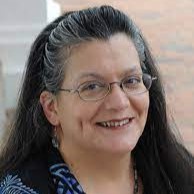Deborah A. Miranda is a mixed-blood Indigenous poet and author of Esselen and Chumash ancestry (nations from the Carmel/Santa Ynez, California area). According to Miranda, in many ways the struggles she faced during her childhood mirrored the historic and current struggles of the Native American community, including sexual abuse, poverty, family dyfunction, and alcoholism. Born in Los Angeles to her Esselen/Chumash father and French/Jewish mother, Miranda lived with her parents until their separation when she was three years old after a domestic violence incident. Two years later, her father was convicted of a violent crime and would spend the following eight years incarcerated in San Quentin State Prison. During this time, Miranda and her mother moved to Washington state, where they would remain until Miranda’s father returned to the family. Miranda recalls the return of her father when she was 13 as the time when she was able to truly connect with her Native heritage for the first time; because she spent the majority of her developing years in predominantly white areas, raised by a white mother, her father’s returned influence became what she refers to as her “crash course in becoming Indian.” Her complicated and ambivalent relationship to her family, particularly as it relates to the abuse and trauma she suffered, is a common thread in her poetry and nonfiction writing. Miranda is best known for her memoir Bad Indians: A Tribal Memoir (Heyday Press, 2012), which explores her own life and traumas, connecting them to the historical traumas of her Native ancestors using historical documents and research. She also uses poetry to heal and explore these subjects, and has written four collections: Indian Cartography (Greenfield Review Press, 1999), The Zen of La Llorona (Salt Publishing, 2005), Raised by Humans (Tia Chucha, 2015), and Altar for Broken Things (BkMk Press 2020). Although she joined academia late in life, earning her PhD at the age of 40 from the University of Washington, she has had a celebrated career as a professor, teaching English at Washington and Lee University. She now lives and works in Virginia with her partner, Margo Solod, and two children, Miranda and Danny, teaching full time and writing during her breaks.

